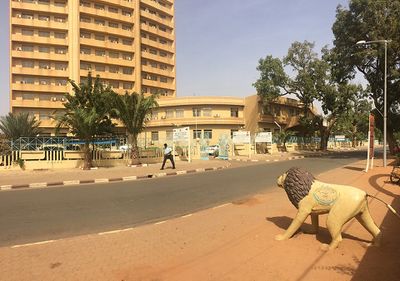Gynopedia needs your support! Please consider contributing content, translating a page, or making a donation today. With your support, we can sustain and expand the website. Gynopedia has no corporate sponsors or advertisers. Your support is crucial and deeply appreciated.
Niamey
OVERVIEW
Contraception (Birth Control)
General Note: There are many types of contraceptives, also known as "birth control," including IUDs, oral contraceptives, patches, shots, and condoms, etc. If you would like to view a full list, click here.
Laws & Social Stigmas
What to Get & Where to Get It
- Marie Stopes Niger: "At the request of the Nigerian Ministry of Health, we began assessment visits to Niger in 2013. From July 2014 we began delivering contraceptive services through mobile outreach teams and four Marie Stopes Ladies, allowing us to reach rural communities surrounding the city of Niamey. Our first centre opened for services in July 2016 in Niamey, and we are looking to increase the capacity of Marie Stopes Niger to drive the success of our centre." Address: Marie Stopes Niger, Quartier Plateau, Boulevard Mali Bero, Rue Issa Berie, IB65-Niamey, BP 12312, Niger; Phone: +227 91 72 08 83.
Costs
Emergency Contraception (Morning After Pill)
Important Notes: Emergency contraception may prevent pregnancy for three days (72 hours) and sometimes five days (120 hours) after unprotected sex. Take EC as soon as possible after unprotected sex to prevent pregnancy. If you don't have access to dedicated EC, oral contraceptives can be used as replacement EC, but remember the following: 1) Only some contraceptives work as EC 2) Different contraceptives require different dosages and time schedules to work as EC 3) You must only use the first 21 pills in 28-day packs and 4) They may be less effective than dedicated EC. For general information on emergency contraceptives, click here and here.
Laws & Social Stigmas
In Niger, emergency contraceptive pills (morning after pills) are available over-the-counter at pharmacies. No prescription is required.[1] For more information, check out this report: Counting What Counts: Tracking Access to Emergency Contraception in Niger (2014)
What to Get & Where to Get It
- You can find emergency contraceptive pills (morning after pills) at pharmacies, and they are sold over-the-counter. Some brands you may find are NorLevo 1.5mg, Optinor, Pregnon, and ellaOne.[2]
- Note: The longest-lasting EC is currently ellaOne. It lasts up to 5 days (120 hours) after unprotected sex. Check to see if your country carries ellaOne. If your country doesn't carry ellaOne, copper IUDs may also prevent pregnancy up to 5 days after unprotected sex. If none of these options are available, and it's been over 3 days since you had unprotected sex, you can still take EC, which may work up to 5 days. Note that EC pills are not 100% effective and should be taken as soon as possible.
Costs
Sexually Transmitted Infections (STIs/STDs)
Important Notes - Learn about PEP and PrEP: If you think that you've been recently exposed to HIV (i.e. within 72 hours), seek out PEP (Post-Exposure Prophylaxis). It's a month-long treatment to prevent HIV infection after exposure, and it may be available in your city. Take PEP as soon as possible. For more information, click here. If you are at risk of HIV exposure, seek out PrEP (Pre-Exposure Prophylaxis). It's a daily oral pill that can prevent HIV infection before exposure. To learn more about PrEP, click here.
Laws & Social Stigmas
What to Get & Where to Get It
Testing Facilities
Support
Costs
Medications & Vaccines
Laws & Social Stigmas
What to Get & Where to Get It
Costs
Menstruation
Note: In addition to pads and tampons, you can also use menstrual cups and menstrual underwear for your period. To learn more about menstrual cups, click here. To learn more about menstrual underwear, click here.
Laws & Social Stigmas
What to Get & Where to Get It
Costs
Gynecological Exams
Laws & Social Stigmas
What to Get & Where to Get It
Costs
Pregnancy
Laws & Social Stigmas
What to Get & Where to Get It
Costs
Abortion
Important Note: There are two main types of abortions: medical (also known as the "abortion pill") and surgical (also known as "in-clinic"). For medical abortions, you take a pill to induce abortion. For surgical abortions, a procedure is performed to induce abortion. For general information about medical and surgical abortions, click here.
Laws & Social Stigmas
What to Get & Where to Get It
Costs
Advocacy & Counseling
Laws & Social Stigmas
What to Get & Where to Get It
Costs
List of Additional Resources
- Ministry of Health
- Family Planning 2020 - Niger
- PSI - Niger: "Niger is a landlocked West African nation that relies on oil production, extractive industries and agriculture. Terrorist attacks from Boko Haram continue to threaten the country, and combined with low rainfall, impede the country’s economic wellness. Health care access is limited outside Niamey, the capital, and there are high rates of malaria transmission, meningococcal meningitis and HIV infection. In 2016, Niger had the largest unmet need for family planning with the highest total fertility rate in the world at 7.6 children per woman."
- Equaldex - Niger: Click here to learn about LGBTQ rights and laws in Niger.
